Zimbabwe Lifts Ban on BBC and CNN
A positive development in Zimbabwe this week when the government announced that after eight years, the BBC and CNN can now freely report from within the country. This breakthrough was the result of a series of meetings between the two broadcasting companies and senior government officials, including Zimbabwe’s Minister of Media, Information, and Publicity Webster Shamu. This change in status is particularly significant for the BBC, which has had an especially tense relationship with the Zimbabwean government. Since its banning in 2001, BBC reporters have risked harassment and arrest by sneaking into Zimbabwe to report illegally. In a statement Minister ...
Gration in the News
While the focus of a Senate hearing yesterday was on the U.S. strategy for helping to implement a comprehensive peace in Sudan, some controversial comments by U.S. Special Envoy Gration sparked a media flurry today that focused more on the rifts within the Obama administration than on the way forward for Sudan. Gration’s assertion that the U.S. classification of Sudan as a state sponsor of terrorism is a ‘political decision’ was one moment that caused a stir in the Senate press gallery. Here’s the original comment, followed by a readout from Enough’s Executive Director John Norris: Here is a quick ...
Persecution of MDC Supporters and Politicians Continues
 blog.jpg)
MDC supporters continue to be intimidated, harassed, and violently attacked by youth groups, militias and war veterans who are loyal to ZANU-PF according to recent reports. In Mashonaland East, a young female MDC activist was hospitalized after being brutally attacked twice in the past two weeks by ZANU-PF supporters. Despite filing a police report, which lists some of her attackers by name, there have been no arrests. Sadly, her story is not unique. In Bulawayo this past month, an MDC activist was falsely accused of insulting Mugabe, and harassed and threatened before being detained by the police for almost a ...
Artists Use Their Craft to Raise Awareness About Genocide
One Million Bones is an innovative fundraising art installation aimed at building awareness for the millions of victims of genocide. The project’s goal is “to increase global awareness of these atrocities while raising the critical funds needed to protect and aid displaced and vulnerable victims.” The project hopes that by installing one million “bones” made of a variety of materials on the National Mall in Washington D.C. that it will create a vivid visual reminder of the memory of genocide. A reminder that will honor the memory of past genocide victims but will also push citizens to speak out against ...
Zimbabwean Army Refuses to Leave Diamond Fields
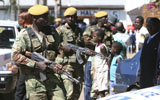
Less than a week after the Zimbabwean government announced that the army would be removed from the Marange diamond fields, the army has declared that it will not leave. In a statement, released on state television, the senior commanding officer in Maincaland province stated that the “security forces will remain in place to deal with illegal dealers and panners.” According to the report, the Mines Minster, Obert Mpofu was said to be in complete accord with the security forces decision. The Zimbabwean army and government have always maintained that the army’s presence in Marange is to provide security in a ...
Zimbabwe Agrees to Remove Soldiers from Diamond Mines
.jpg)
In a surprising turn of events the Zimbabwe government announced on Sunday that it will withdraw all of its soldiers from the Marange diamond fields. This announcement comes amid recent criticism by Human Rights Watch over the ongoing human rights abuses being committed by the Army in the diamond fields, but seems, mostly, to have been prompted by a visit of representatives from the Kimberley Process. As I reported earlier, the Kimberley Process team is in Zimbabwe investigating the allegations of human rights abuse and determining if the country still meets the group’s high standards. This weekend, following visits to ...
Are Zimbabwe’s Diamonds ‘Bloody’?
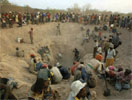
Could Zimbabwe’s diamonds be considered ‘blood diamonds’? According to a recently released report by Human Right’s Watch entitled “Diamonds in the Rough” the answer is yes. The report claims that since last year the Zimbabwean Army, controlled by ZANU-PF, the party of embattled President Robert Mugabe, has used violent and illegal methods to control the diamond mines in the Marange district in eastern Zimbabwe. On the surface, the army’s decision to retake control of the diamond fields in October 2008 appeared legitimate. The state media depicted the military operation, called No Return, as an attempt to restore order and control ...
Zimbabwe: Progress on Human Rights Painfully Slow
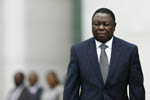
Zimbabwean Prime Minister Morgan Tsvangirai recently wrapped up a three-week fundraising tour, during which he touted the successes of the unity government in an effort to drum up support from the United States and Europe. At the same time, Amnesty International’s Secretary General Irene Khan toured Zimbabwe, exposing the continued "woefully slow" progress by the unity government to improve the horrible human rights situation there. Though Tsvangirai vowed that he would promote respect for human rights when he took office, the results thus far have been disheartening. Human rights activists, journalists and lawyers continue to be harassed, intimidated, threatened, and ...
Somalia: Will Anyone Be Left to Tell the Tale?
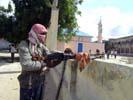
It seems there may be a campaign underway to rid Mogadishu of its independent media. Recent reports highlight the increasing harassment and intimidation of journalists in Mogadishu. While dozens of journalists have been killed since late 2006, there has been a visible increase in the targeting of journalists this year. Thus far in 2009 , five journalists have already been killed – most recently Mukhtar Mohamed Hirabe, director of Radio Shabelle. Dozens more have fled Mogadishu after receiving death threats. According to Hamdi Kadiye, an executive member of the National Union of Somali Journalists, “We [journalists] are in a very ...
Report: Zimbabweans Flee “As Matter of Survival”
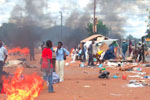
Since the creation of the Government of National Unity in February, some reports have indicated that the situation in Zimbabwe is improving. However, a recent report from Doctors Without Borders (MSF) – No Refuge, Access Denied: Medical and Humanitarian Needs of Zimbabweans in South Africa – offers a strong counter argument. In the past three years, an estimated 3 million Zimbabweans have crossed into South Africa trying to escape from ongoing food shortages, political turmoil, and a failing health system. This flow of people has not ceased with the new government. On the contrary, the report states, “Zimbabweans continue to ...

